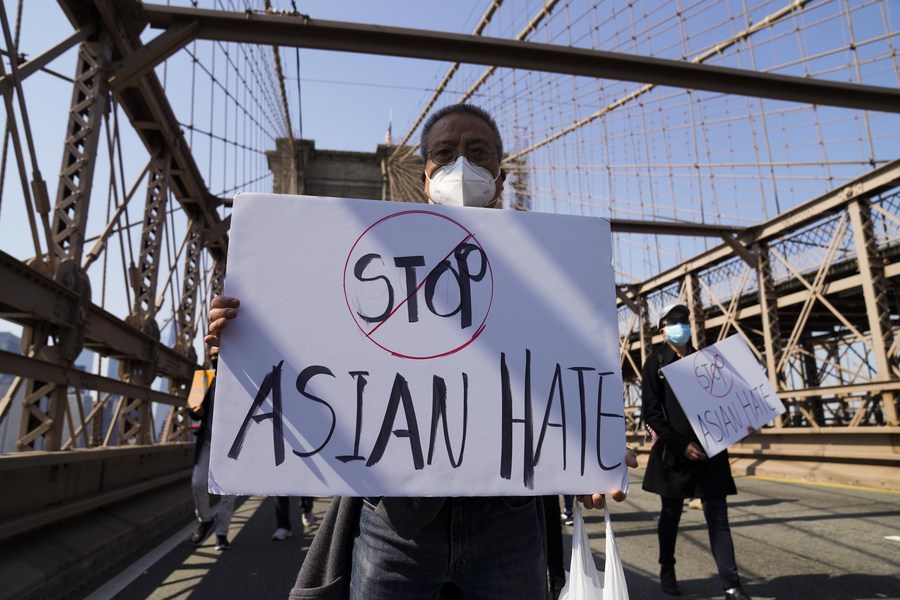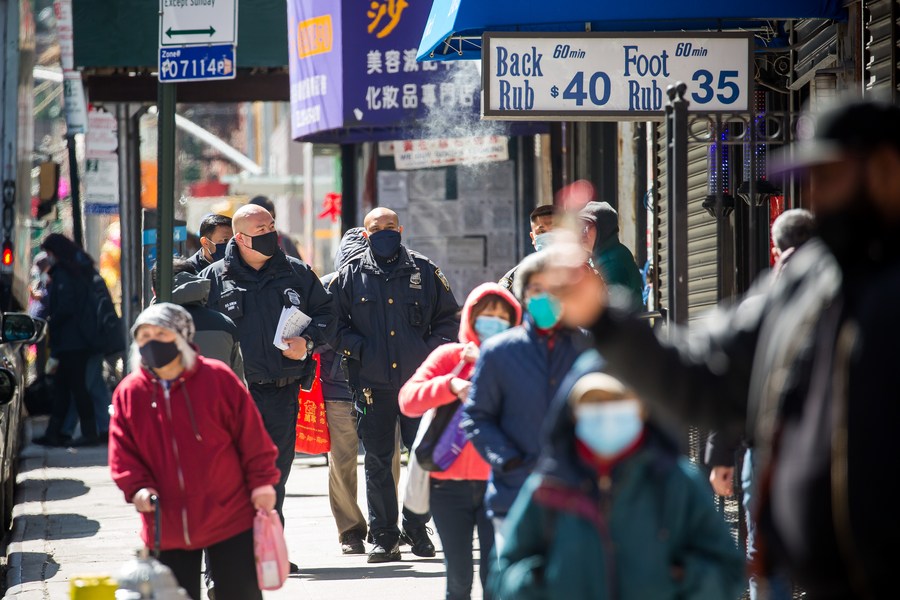-- Too many Asian Americans have been attacked, harassed, blamed, and scapegoated since the pandemic erupted in the United States early last year.
-- Besides rising anti-Asian sentiment, Asian Americans have to grapple with the country's highest rates of long-term unemployment as the pandemic has shuttered hotels, restaurants, shopping centers, beauty salons and other sectors of the economy for more than a year, said a USA Today report.
-- "The important thing to remember is that this is really not an exceptional moment by any means," said Courtney Sato, a postdoctoral fellow at Harvard's Charles Warren Center for Studies in American History. "It's really part of a much longer genealogy of anti-Asian violence that reaches as far back as the 19th century."
WASHINGTON, April 17 (Xinhua) -- "There has never been a situation during my lifetime that I've felt this level of fear," U.S. House lawmaker Andy Kim, a Korean American, said about the local skyrocketing anti-Asian hate crimes during the COVID-19 pandemic in the country.
He confessed that even his five-year-old son had encountered anti-Asian discrimination.
This is a historic moment right now for the United States to "determine the next few decades of how Asian Americans are treated and understood and accepted in this country," the congressman told a press conference here earlier this week.
LEGISLATION
The U.S. Senate will likely vote next week on an anti-Asian American hate crimes bill, Senate Majority Leader Chuck Schumer said on Thursday, one day after senators voted 92-6 to open debate on the legislation with sweeping bipartisan support.
Under the COVID-19 Hate Crimes Act, the Justice Department will assign an official to expedite reviews of COVID-19-related hate crimes, as well as coordinate with local law enforcement and community-based groups to facilitate and raise awareness about reporting on hate crimes.
The legislation would also call on the federal administration to offer guidance on "best practices to mitigate racially discriminatory language" describing the coronavirus pandemic.

People march to protest against anti-Asian hate crimes on Brooklyn Bridge in New York, the United States, April 4, 2021. (Xinhua/Wang Ying)
"Words matter," said Senator Mazie Hirono, who introduced the bill together with House Democrat Grace Meng. "When you have a president who deems the virus to be the 'China virus' or to have members of his administration refer to it as 'kung flu,' you create an environment where people will be motivated because of whatever reasons they have to commit these kinds of crimes," the senator said, referring to former President Donald Trump, who frequently used such phrases to describe the coronavirus.
The Senate has a "moral imperative to take action," Schumer had told reporters previously, noting that he is "open to strengthening the bill."
Schumer and Senate Republican Leader Mitch McConnell have started negotiating a potential amendments deal, including measures to improve the reporting of hate crimes, beef up related training for law enforcement and set up a hotline where hate crimes can be reported.
President Joe Biden met with members of the Congressional Asian Pacific American Caucus on Thursday and voiced his support for passing the legislation.
Meanwhile, the White House announced new actions last month, including additional funding and a cross-agency initiative to battle anti-Asian violence and discrimination.
CRISIS POINT
The legislation came after eight people, including six women of Asian descent, were shot dead in the Atlanta area last month. Protesters of different colors and ages took to the streets in more than 60 U.S. cities in the weeks after the shootings, calling to stop anti-Asian violence which has stoked widespread fear and anger among people of Asian descent in the country.

People attend a "Stop Asian Hate" candlelight vigil in a city park of Alhambra, Los Angeles County, California, the United States, March 20, 2021. (Xinhua)
"The Asian American community has reached a crisis point that cannot be ignored," Judy Chu, a Democratic lawmaker from California, said after the Atlanta shootings.
"For more than a year, the Asian American community has been fighting two viruses, the COVID-19 pandemic and anti-Asian hate," Meng said during a press conference on Tuesday. "We've heard about and seen videos of both young and elderly Asian Americans being shoved to the ground, stomped on, being spat on and shunned. These heinous acts have been outrageous, unconscionable and they must end."
Too many Asian Americans have been attacked, harassed, blamed, and scapegoated since the pandemic erupted in the United States early last year.
According to Stop AAPI Hate, a California-based nonprofit social organization tracking incidents of violence against Asian Americans and Pacific Islanders (AAPI) during the pandemic, it received nearly 3,800 reports of attacks or abuse against people of Asian descent between March 2020 and February 2021 and the real number of such incidents is believed to be far more than that.
An analysis of police data by the Center for the Study of Hate and Extremism at California State University, San Bernardino, found that in the 16 largest U.S. cities in 2020, overall hate crimes fell 7 percent but those targeting Asian Americans surged nearly 150 percent.
Besides rising anti-Asian sentiment, Asian Americans have to grapple with the country's highest rates of long-term unemployment as the pandemic has shuttered hotels, restaurants, shopping centers, beauty salons and other sectors of the economy for more than a year, said a USA Today report.

Police officers patrol in Chinatown in New York, the United States, March 19, 2021. (Photo by Michael Nagle/Xinhua)
Data from the Bureau of Labor Statistics showed that 48 percent of estimated 615,000 unemployed Asian Americans were without work for six months-plus through the first quarter of this year, surpassing the portion of long-term unemployed among jobless workers in the African American population (43 percent), white population (39 percent) and Hispanic population (39 percent).
LONG WAY TO GO
During his first week in office, Biden issued a memorandum to condemn coronavirus-related racism. But anti-Asian violence has continued to be rampant and showed no signs of abating despite nationwide attention and weeks-long protests in the wake of the Atlanta shootings, reflecting long-term challenges for the White House to crack down on anti-Asian hate crimes.
The long history of discrimination against Asians, the deepening political divide, as well as bigotry and stereotypes like regarding Asian Americans as "perpetual foreigners" who never assimilate, all play a role in the surge of anti-Asian violence in the United States during the pandemic, local analysts have noted.
"The important thing to remember is that this is really not an exceptional moment by any means," said Courtney Sato, a postdoctoral fellow at Harvard's Charles Warren Center for Studies in American History. "It's really part of a much longer genealogy of anti-Asian violence that reaches as far back as the 19th century."
On Capitol Hill, the Congress's response has mostly fallen along party lines. When the House passed a non-binding resolution in September 2020 to denounce anti-Asian racism, 164 Republicans voted against it and only 14 voted in favor, said Caitlin Chin, a research analyst at the Brookings Institution.

People march to protest against anti-Asian hate crimes on Brooklyn Bridge in New York, the United States, April 4, 2021. (Xinhua/Wang Ying)
Biden has also been criticized over the lack of Asian American and Pacific Islanders serving in top roles in his administration.
As for law enforcement, Robert Boyce, a retired chief of detectives from the New York Police Department, told ABC News that law enforcement officers tasked with investigating a crime's motivation face many obstacles in finding evidence of hate. As a result, hate crimes are hard to prosecute.
The good news is that Asian Americans are the fastest-growing racial demographic in the United States and are becoming an increasingly important electorate, Chin noted, suggesting both Democratic and Republican parties could benefit from protecting the Asian American community.
However, changes may not come soon. Asian Americans represent a population of 21 million people in the country with the highest income inequality of any racial group. There is still a long way to go before Asian people can break the bamboo ceiling in the U.S. political and economic fields.
(Video reporter: Ding Chunyu; Video editors: Hong Yan, Wu Yao, Zhang Yuhong, Lin Lin)■




